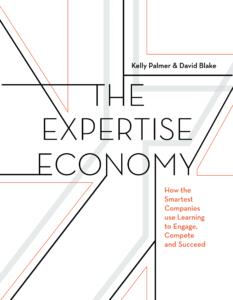How We Work
The world of work is going through a fundamental transition. In the age of digitization, automation, and acceleration, companies have a new imperative: to build workplaces in which employees are encouraged and given the opportunity to learn new skills as a regular part of their work lives. Workers of the future must be quick to evolve, constantly developing new skills. This is what Kelly Palmer and David Blake, two top officials at Degreed, argue in The Expertise Economy: How the Smartest Companies Use Learning to Engage, Compete, and Succeed.
The onus is on businesses to make this happen, they write. “While government can be a powerful force when it comes to launching skills initiatives, it’s companies and their leaders who need to lead the way.”
I interviewed Kelly about what businesses, employees and workers of the future — including today’s graduates — should know in order to come out on top.
What is the “Expert Revolution”?
There have been previous major shifts in the world of work, such as the Industrial Revolution. Over the past couple of decades, there’s been a technological revolution. Now, we’re looking at an Expert Revolution, in which workplace skills are the most important currency. That’s why we call it the Expertise Economy — expertise is any organization’s most crucial asset.
With digital disruption constantly changing how business is done and offering new possibilities for how business can be done, we need a workforce full of agile learners who are passionate about developing new skills all the time.
This requires getting rid of the old ways of doing corporate L&D (Learning and Development). Top-down strategies in which bosses send employees to day-long lecture sessions in classrooms are no longer the answer. In our book, we explore the proven best practices for workers to develop real expertise, and for business leaders to inspire them to do so.
Shift to Skills from Credentials
Hiring managers think in terms of degrees and credentials more than skills. Will this shift over time? Why or why not?
It has to shift. We call for this to happen as quickly as possible. Already, some business leaders hire new graduates only to find that these new hires are wholly unprepared to succeed at their jobs or to navigate the real world of work, especially in this challenging and rapidly changing environment.
A university pedigree doesn’t tell a hiring manager what skills or knowledge the applicant has. The same goes for GPA, job titles, and logos on a resume — all factors that have in the past been seen as “credentials,” but in reality, don’t show you a candidate’s potential.
This is why at Degreed, we offer skill assessments and certifications. These show the kinds of expertise each candidate brings to the table. Most current resumes don’t provide a clear picture of the knowledge a candidate has learned, whether through school, in a learning program, or through years of experience.
It’s also time to fill the gap between what students learn in college and what they need to do practically to be successful in the workplace. Universities and corporations can build closer connections to help give students a better shot at developing relevant skills for the job market.
Become a Lifelong Learner
The best advice I ever received was from Jim Rohn when he said, “Work harder on yourself than your job.” That has served me well and you advocate lifelong learning. There has never been an easier time to learn than now, so the question seemingly becomes motivation. How do we best motivate people to become lifelong learners?
In the book, we explore the research on motivation. Right now, most companies have learning and talent strategies that are the opposite of what science tells us is most effective.
For starters, it’s time to put learners in the driver’s seat. Businesses should let employees decide what they want to learn. But right now, instead of providing workers with autonomy and choice, organizations have a command and control model telling employees what to learn and when — including the dreaded compliance training.
Then, instead of making sure employees achieve mastery and competence of a new skill, companies appear to be satisfied that employees have completed “training” regardless of whether they have actually learned anything or developed new skills.
The key is for companies to determine the skills they need to succeed, and let that information be known throughout the company. Workers gravitate toward learning skills that will advance their careers, but sometimes choose to pursue paths that will lead them to a different part of the organization, rather than pursuing the next “obvious” step in their current path.
We also explain the styles of learning that work best, including a four-stage “learning loop” that includes knowledge, practice, feedback, and reflection. These kinds of things don’t just make employees better learners. They also increase engagement, as well as attraction and retention.
What’s the Skills Quotient?
There isn’t a CEO in the world today who can answer for the skills of their organization. Just as Net Promoter Score (NPS) gave a common framework for customer satisfaction, we have long needed that type of solution for skills. That is what Skills Quotient (SQ) does; it introduces a common, non-proprietary framework that every company can use to measure the skills required against the skills needed, for individuals, teams, and the entire company. It elevates the practice of talent and skills measurement from the middle of the organization to the C-Suite, giving every CEO a way to answer for the skills of their organization and a way to track progress with accountability. 
Skills Quotient more specifically can calculate how skilled someone is for a particular job. By quantifying the extent to which you’ve mastered the necessary skills, you can find your weak points and set learning goals to match.
For example, let’s say you’re a technical writer inside a software company. The company has outlined nine critical skills for you to master, each with a target “mastery level.” (In the book, we explain a system for making these determinations.) You determine your current skill level against the mastery level to come up with the Skills Quotient, which really shows where you may have a skills gap. With this data, you can see skills gaps at the individual, group, or company level. This is imperative for helping employees and companies figure out their skills strategy for the future and can help provide new career opportunities to people within your company.
Start a Culture of Learning
If someone wants to start a culture of learning within an organization, what are the very first steps you recommend?
It begins with building a positive culture designed to encourage autonomy and self-direction. Then, you work on developing a culture of continuous learning. In the book, we lay out how to do this.
Bringing employees into the discussion is crucial. People have a natural desire to learn, and we need to enable, nurture, and encourage that. You need to communicate actively and clearly so that all your employees know about your organization’s commitment to continuous learning. Make sure this message is embedded not only in your company’s mission, vision, and values, but also in everything you do. Perhaps even more importantly, make sure that as leaders and managers you are modeling and communicating the value of learning by consistently building your own skills.
Obviously, be sure to provide your employees with the resources that allow them to learn anywhere, anytime — including through online courses, audiobooks, podcasts, or a video learning library. Show support by giving them dedicated time to learn. And understand their career goals. For learning to be effective, it needs to be connected to those goals. Managers should check in with their employees regularly to gain a better understanding of their career goals, strengths, areas for development, and the short- or long-terms goals they want to achieve. Also discuss how their learning will contribute to organizational goals and the vision and mission of the company.
Advice for New Graduates
What advice do you have for those just graduating?
 I hear from college students and new graduates all the time. They’re worried that what they studied may not be related to what they want to do with their careers. Many think that careers are set in stone — that whatever path they go on, they’re going to have to stay on. So my first piece of advice is always to drop those worries. Your career will take twists and turns that you can’t possibly predict. Mine did. I was an English and communications major, but I ended up in tech. I kept getting amazing opportunities to do things that had nothing to do with what I studied in school. I embraced every opportunity. Eventually, I made a distinct choice on where to focus my attention — on learning. But no one could have predicted my career path.
I hear from college students and new graduates all the time. They’re worried that what they studied may not be related to what they want to do with their careers. Many think that careers are set in stone — that whatever path they go on, they’re going to have to stay on. So my first piece of advice is always to drop those worries. Your career will take twists and turns that you can’t possibly predict. Mine did. I was an English and communications major, but I ended up in tech. I kept getting amazing opportunities to do things that had nothing to do with what I studied in school. I embraced every opportunity. Eventually, I made a distinct choice on where to focus my attention — on learning. But no one could have predicted my career path.
The key is to be open to opportunities and new learning experiences. And any time you have a choice of companies to work for, always choose those that emphasize learning and growing, and providing people with new opportunities inside the company. Those are the ones where you’ll learn the most and gain the most perspective. They’ll help open your mind to new possibilities about what might be next in your career.
What skills will be most important in the future?
As artificial intelligence, machine learning and new technologies keep offering new opportunities and concerns, businesses will need people who can develop expertise in them. That’s why one of the most important skills of all is being an agile learner – having innate curiosity and the ability to learn new things. You want your workforce to have a desire and passion for continuous learning.
Also, the uniquely human skills that machines can’t take over will become more important than ever. These include effective communication, problem-solving, critical thinking, and emotional intelligence. People with these skills will come up with new ideas and solutions and will be those most in-demand in the workforce of the future.
For more information, see The Expertise Economy: How the Smartest Companies Use Learning to Engage, Compete, and Succeed.

